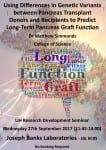Dr Matthew Simmonds from the School of Life Sciences will lead the next LIH Research Development Seminar entitled, Using Differences in Genetic Variants between Pancreas Transplant Donors and Recipients to Predict Long-Term Pancreas Graft Function
11:45am-2pm* Wednesday 27th September 2017
Joseph Banks Laboratories – JBL0C05
Whole organ pancreas transplantation has the potential to provide life-long independence from exogenous insulin for people with type 1 diabetes (T1D), who have poor glycaemic control and aggressive diabetes related complications. Loss of graft function (insulin production) can occur causing return to insulin injections and loss of the associated therapeutic benefits, including improvements in secondary complications. As there are currently no known early predictors of later graft dysfunction, much of my recent research has focused on establishing a UK Pancreas Transplant DNA cohort within which to investigate potential genetic variation that could be used to predict long-term graft function. I will discuss how genetic variation in caveolin-1, involved in signal transduction and tissue fibrosis, within pancreas transplant donors correlates with decreased long-term graft function in people with T1D, resulting in over two years less graft function than those without the variant. Caveolin-1 variation in pancreas transplant recipients however did not correlate with long-term graft function, suggesting that variation in the donor and recipient’s genome could lead to transplant loss by different mechanisms. I will also talk about our work looking at genetic contributors to T1D, including CTLA-4, PTPN22, and IL-2RA, present in our pancreas transplant recipients and whether these could impact upon long-term pancreas graft function. We have shown that presence of CTLA-4 variants in our recipients was predictive of reduced long-term pancreas function, whereas variation within CTLA-4 in our donors did not predict long-term graft function. Now unique pathways within both donors and recipients have been identified that can predict long-term graft function I will also discuss how I plan to start moving this research forward so that in the future these results can be translated to provide clinicians with an early opportunity to perform targeted therapeutic interventions to prolong the functional lifespan of the organ and to better inform and increase the number of more appropriate organs selected for transplantation.
The LIH extends a warm welcome to all interested in this exciting area.
*11:45-1pm presentation with Q&A
1-2pm optional discussion and action planning
